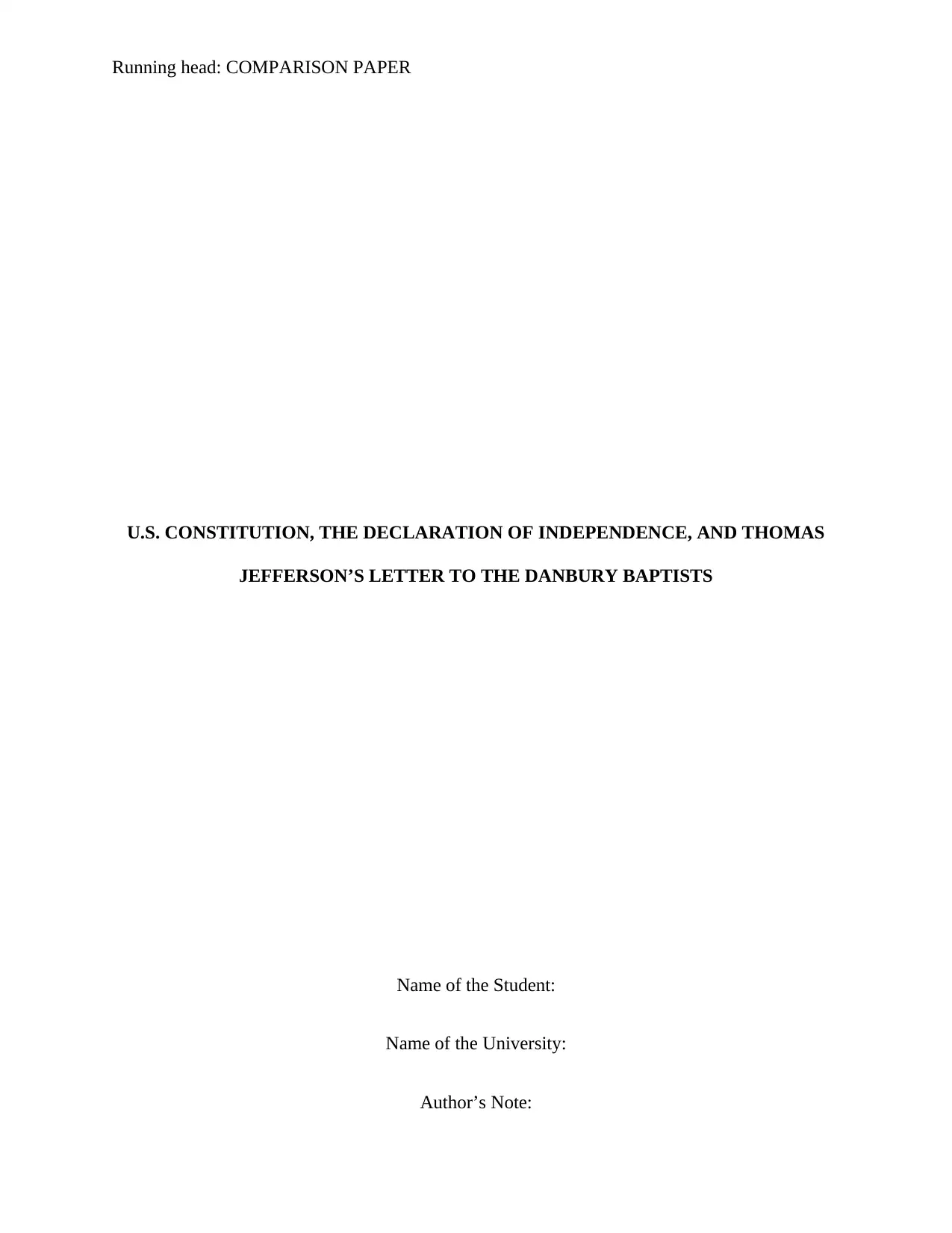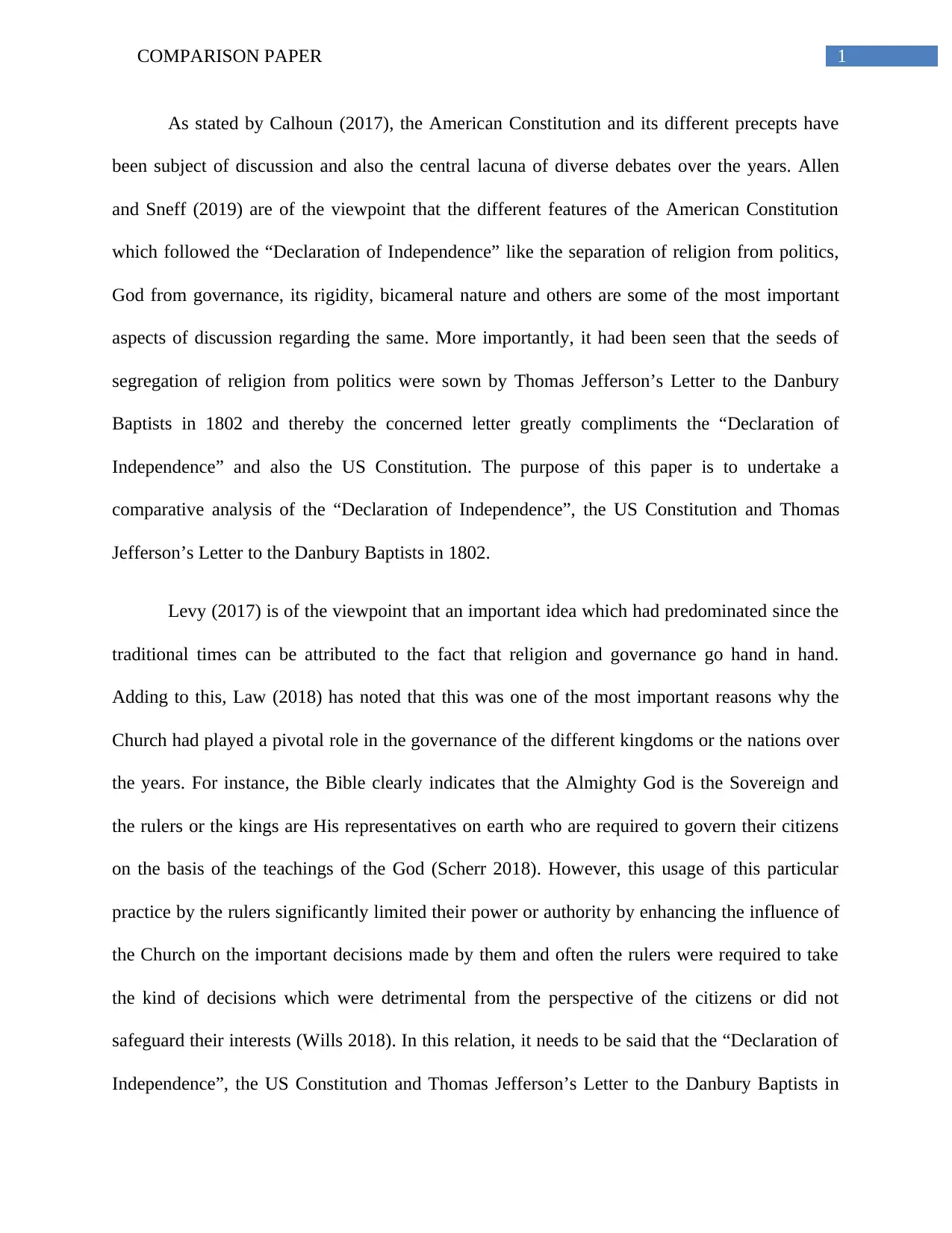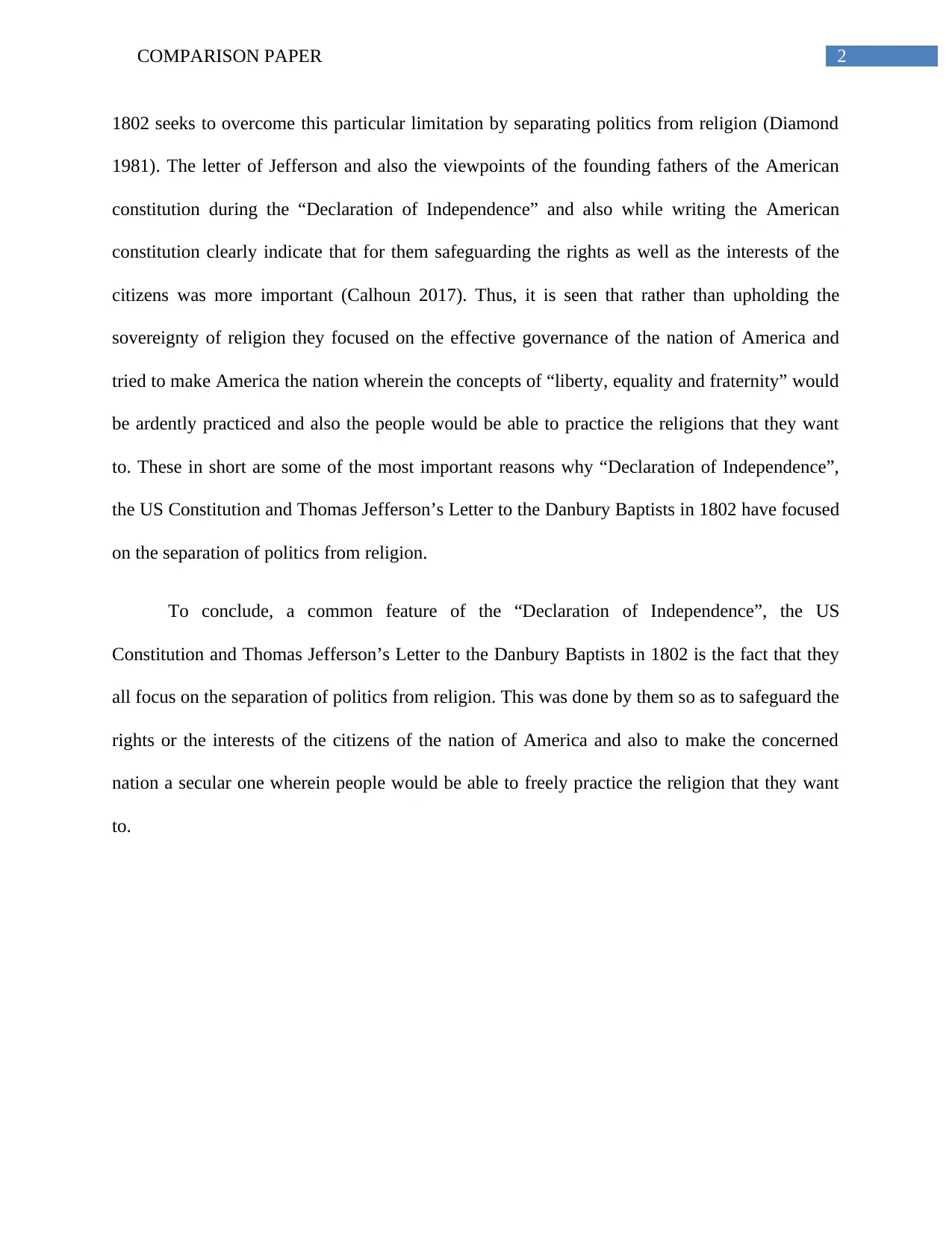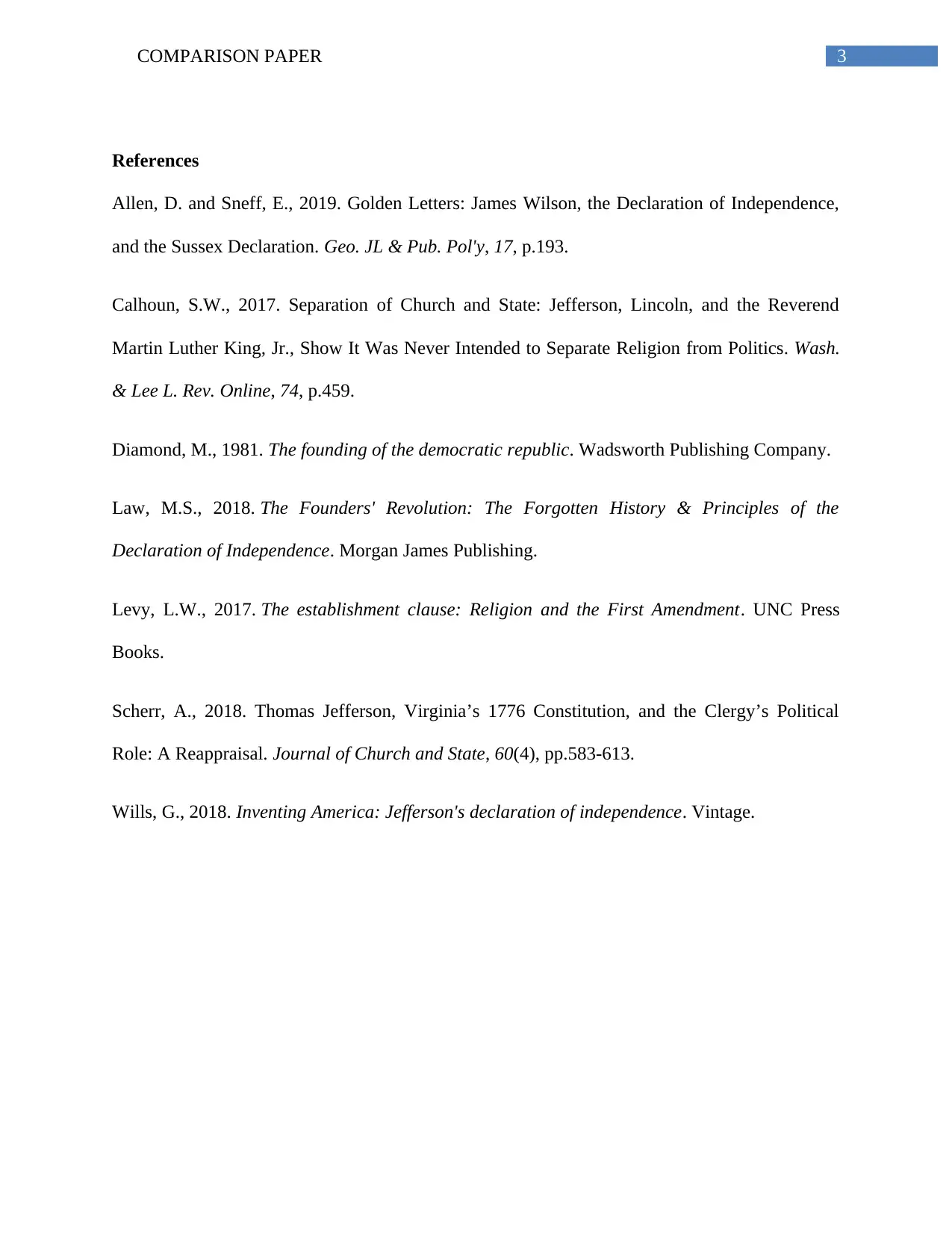U.S. Constitution, Declaration, and Jefferson's Letter Comparison
VerifiedAdded on 2022/08/19
|4
|904
|17
Essay
AI Summary
This paper conducts a comparative analysis of the Declaration of Independence, the U.S. Constitution, and Thomas Jefferson's Letter to the Danbury Baptists, focusing on the separation of politics and religion. The essay explores the historical context, including the influence of religious governance and the Founding Fathers' emphasis on safeguarding citizens' rights. It highlights how these documents collectively aimed to establish a secular nation where individuals could freely practice their religions, thereby overcoming the limitations of merging religion and governance. The analysis emphasizes the common goal of protecting individual liberties and promoting effective governance in the United States.

Running head: COMPARISON PAPER
U.S. CONSTITUTION, THE DECLARATION OF INDEPENDENCE, AND THOMAS
JEFFERSON’S LETTER TO THE DANBURY BAPTISTS
Name of the Student:
Name of the University:
Author’s Note:
U.S. CONSTITUTION, THE DECLARATION OF INDEPENDENCE, AND THOMAS
JEFFERSON’S LETTER TO THE DANBURY BAPTISTS
Name of the Student:
Name of the University:
Author’s Note:
Paraphrase This Document
Need a fresh take? Get an instant paraphrase of this document with our AI Paraphraser

1COMPARISON PAPER
As stated by Calhoun (2017), the American Constitution and its different precepts have
been subject of discussion and also the central lacuna of diverse debates over the years. Allen
and Sneff (2019) are of the viewpoint that the different features of the American Constitution
which followed the “Declaration of Independence” like the separation of religion from politics,
God from governance, its rigidity, bicameral nature and others are some of the most important
aspects of discussion regarding the same. More importantly, it had been seen that the seeds of
segregation of religion from politics were sown by Thomas Jefferson’s Letter to the Danbury
Baptists in 1802 and thereby the concerned letter greatly compliments the “Declaration of
Independence” and also the US Constitution. The purpose of this paper is to undertake a
comparative analysis of the “Declaration of Independence”, the US Constitution and Thomas
Jefferson’s Letter to the Danbury Baptists in 1802.
Levy (2017) is of the viewpoint that an important idea which had predominated since the
traditional times can be attributed to the fact that religion and governance go hand in hand.
Adding to this, Law (2018) has noted that this was one of the most important reasons why the
Church had played a pivotal role in the governance of the different kingdoms or the nations over
the years. For instance, the Bible clearly indicates that the Almighty God is the Sovereign and
the rulers or the kings are His representatives on earth who are required to govern their citizens
on the basis of the teachings of the God (Scherr 2018). However, this usage of this particular
practice by the rulers significantly limited their power or authority by enhancing the influence of
the Church on the important decisions made by them and often the rulers were required to take
the kind of decisions which were detrimental from the perspective of the citizens or did not
safeguard their interests (Wills 2018). In this relation, it needs to be said that the “Declaration of
Independence”, the US Constitution and Thomas Jefferson’s Letter to the Danbury Baptists in
As stated by Calhoun (2017), the American Constitution and its different precepts have
been subject of discussion and also the central lacuna of diverse debates over the years. Allen
and Sneff (2019) are of the viewpoint that the different features of the American Constitution
which followed the “Declaration of Independence” like the separation of religion from politics,
God from governance, its rigidity, bicameral nature and others are some of the most important
aspects of discussion regarding the same. More importantly, it had been seen that the seeds of
segregation of religion from politics were sown by Thomas Jefferson’s Letter to the Danbury
Baptists in 1802 and thereby the concerned letter greatly compliments the “Declaration of
Independence” and also the US Constitution. The purpose of this paper is to undertake a
comparative analysis of the “Declaration of Independence”, the US Constitution and Thomas
Jefferson’s Letter to the Danbury Baptists in 1802.
Levy (2017) is of the viewpoint that an important idea which had predominated since the
traditional times can be attributed to the fact that religion and governance go hand in hand.
Adding to this, Law (2018) has noted that this was one of the most important reasons why the
Church had played a pivotal role in the governance of the different kingdoms or the nations over
the years. For instance, the Bible clearly indicates that the Almighty God is the Sovereign and
the rulers or the kings are His representatives on earth who are required to govern their citizens
on the basis of the teachings of the God (Scherr 2018). However, this usage of this particular
practice by the rulers significantly limited their power or authority by enhancing the influence of
the Church on the important decisions made by them and often the rulers were required to take
the kind of decisions which were detrimental from the perspective of the citizens or did not
safeguard their interests (Wills 2018). In this relation, it needs to be said that the “Declaration of
Independence”, the US Constitution and Thomas Jefferson’s Letter to the Danbury Baptists in

2COMPARISON PAPER
1802 seeks to overcome this particular limitation by separating politics from religion (Diamond
1981). The letter of Jefferson and also the viewpoints of the founding fathers of the American
constitution during the “Declaration of Independence” and also while writing the American
constitution clearly indicate that for them safeguarding the rights as well as the interests of the
citizens was more important (Calhoun 2017). Thus, it is seen that rather than upholding the
sovereignty of religion they focused on the effective governance of the nation of America and
tried to make America the nation wherein the concepts of “liberty, equality and fraternity” would
be ardently practiced and also the people would be able to practice the religions that they want
to. These in short are some of the most important reasons why “Declaration of Independence”,
the US Constitution and Thomas Jefferson’s Letter to the Danbury Baptists in 1802 have focused
on the separation of politics from religion.
To conclude, a common feature of the “Declaration of Independence”, the US
Constitution and Thomas Jefferson’s Letter to the Danbury Baptists in 1802 is the fact that they
all focus on the separation of politics from religion. This was done by them so as to safeguard the
rights or the interests of the citizens of the nation of America and also to make the concerned
nation a secular one wherein people would be able to freely practice the religion that they want
to.
1802 seeks to overcome this particular limitation by separating politics from religion (Diamond
1981). The letter of Jefferson and also the viewpoints of the founding fathers of the American
constitution during the “Declaration of Independence” and also while writing the American
constitution clearly indicate that for them safeguarding the rights as well as the interests of the
citizens was more important (Calhoun 2017). Thus, it is seen that rather than upholding the
sovereignty of religion they focused on the effective governance of the nation of America and
tried to make America the nation wherein the concepts of “liberty, equality and fraternity” would
be ardently practiced and also the people would be able to practice the religions that they want
to. These in short are some of the most important reasons why “Declaration of Independence”,
the US Constitution and Thomas Jefferson’s Letter to the Danbury Baptists in 1802 have focused
on the separation of politics from religion.
To conclude, a common feature of the “Declaration of Independence”, the US
Constitution and Thomas Jefferson’s Letter to the Danbury Baptists in 1802 is the fact that they
all focus on the separation of politics from religion. This was done by them so as to safeguard the
rights or the interests of the citizens of the nation of America and also to make the concerned
nation a secular one wherein people would be able to freely practice the religion that they want
to.
⊘ This is a preview!⊘
Do you want full access?
Subscribe today to unlock all pages.

Trusted by 1+ million students worldwide

3COMPARISON PAPER
References
Allen, D. and Sneff, E., 2019. Golden Letters: James Wilson, the Declaration of Independence,
and the Sussex Declaration. Geo. JL & Pub. Pol'y, 17, p.193.
Calhoun, S.W., 2017. Separation of Church and State: Jefferson, Lincoln, and the Reverend
Martin Luther King, Jr., Show It Was Never Intended to Separate Religion from Politics. Wash.
& Lee L. Rev. Online, 74, p.459.
Diamond, M., 1981. The founding of the democratic republic. Wadsworth Publishing Company.
Law, M.S., 2018. The Founders' Revolution: The Forgotten History & Principles of the
Declaration of Independence. Morgan James Publishing.
Levy, L.W., 2017. The establishment clause: Religion and the First Amendment. UNC Press
Books.
Scherr, A., 2018. Thomas Jefferson, Virginia’s 1776 Constitution, and the Clergy’s Political
Role: A Reappraisal. Journal of Church and State, 60(4), pp.583-613.
Wills, G., 2018. Inventing America: Jefferson's declaration of independence. Vintage.
References
Allen, D. and Sneff, E., 2019. Golden Letters: James Wilson, the Declaration of Independence,
and the Sussex Declaration. Geo. JL & Pub. Pol'y, 17, p.193.
Calhoun, S.W., 2017. Separation of Church and State: Jefferson, Lincoln, and the Reverend
Martin Luther King, Jr., Show It Was Never Intended to Separate Religion from Politics. Wash.
& Lee L. Rev. Online, 74, p.459.
Diamond, M., 1981. The founding of the democratic republic. Wadsworth Publishing Company.
Law, M.S., 2018. The Founders' Revolution: The Forgotten History & Principles of the
Declaration of Independence. Morgan James Publishing.
Levy, L.W., 2017. The establishment clause: Religion and the First Amendment. UNC Press
Books.
Scherr, A., 2018. Thomas Jefferson, Virginia’s 1776 Constitution, and the Clergy’s Political
Role: A Reappraisal. Journal of Church and State, 60(4), pp.583-613.
Wills, G., 2018. Inventing America: Jefferson's declaration of independence. Vintage.
1 out of 4
Related Documents
Your All-in-One AI-Powered Toolkit for Academic Success.
+13062052269
info@desklib.com
Available 24*7 on WhatsApp / Email
![[object Object]](/_next/static/media/star-bottom.7253800d.svg)
Unlock your academic potential
Copyright © 2020–2026 A2Z Services. All Rights Reserved. Developed and managed by ZUCOL.




